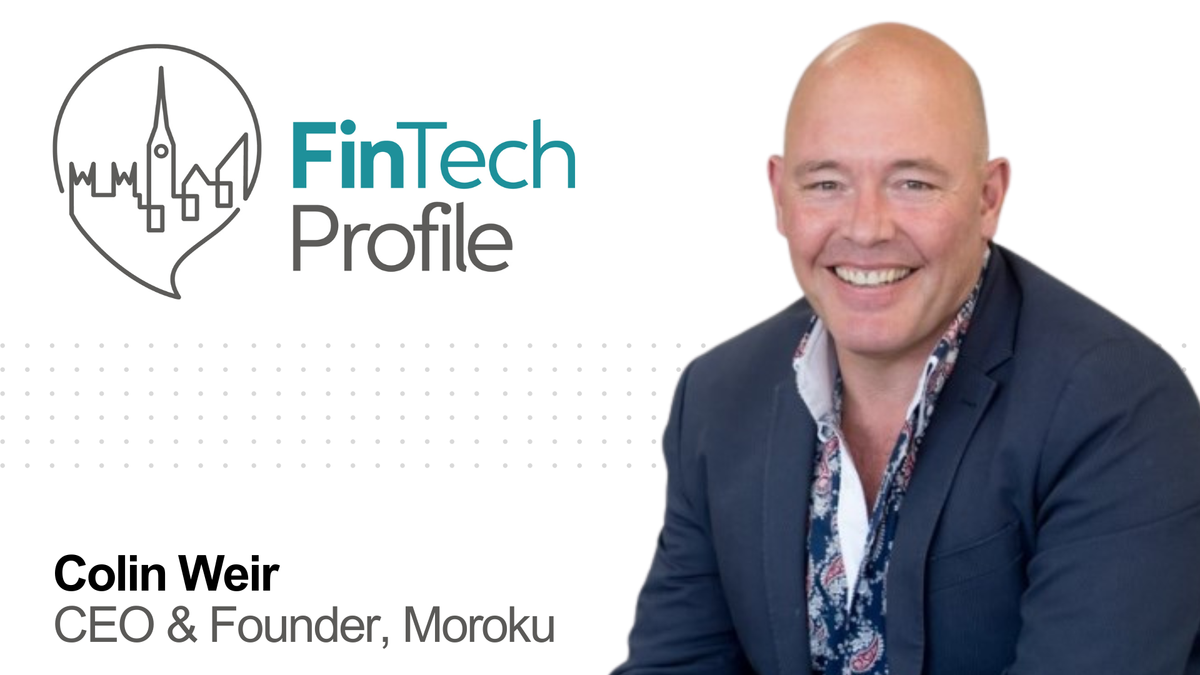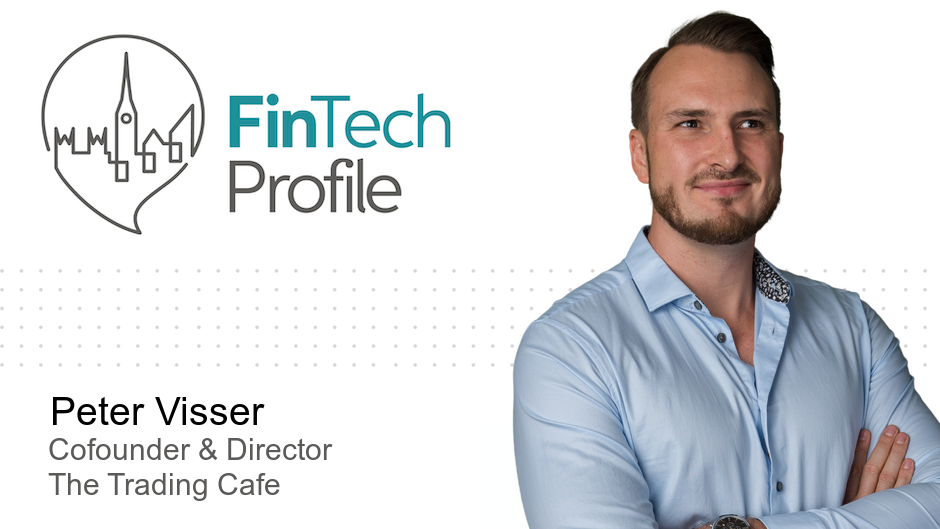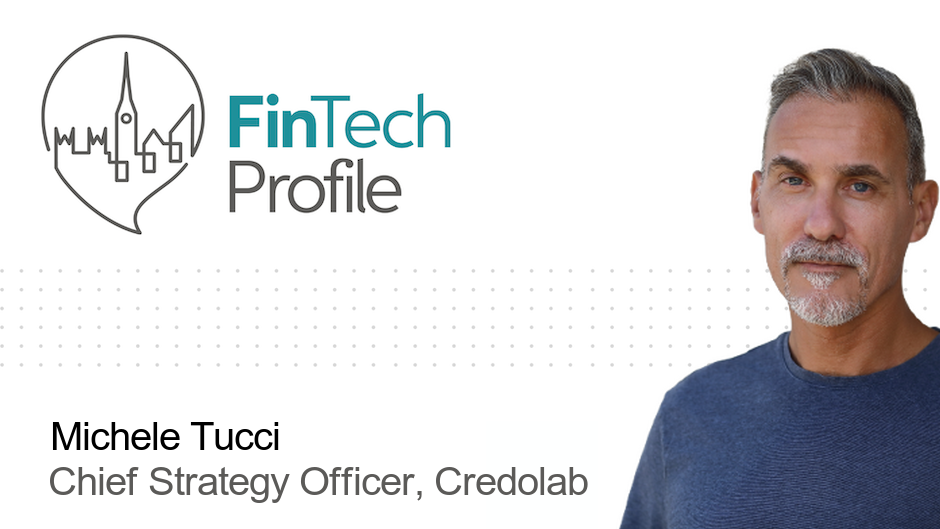Colin Weir, CEO & Founder, Moroku

Hello and welcome to the Friday edition of FinTech Profile. Today we’re meeting Colin Weir, CEO & Founder of Moroku. The company offers an SaaS engagement and loyalty platform that uses game and data to enable Financial Services providers to differentiate and create value by taking their customers on a journey of strong habit-building and mastery.
Over to you Colin:
Who are you and what’s your background?
Grew up in New Zealand, selling my first software platform and algorithm set by commercialising my post-graduate thesis, a computer model to forecast the economic impact of management decisions on New Zealand forests.
Went to London to continue the research and got diverted into banking, building my first fintech with some friends, a trade finance internet banking platform and Europe’s first commercial certification authority for the issuance of digital certificates and strong crypto, for the world’s 20 largest banks, successfully exiting to Netscape. Since then, I’ve continued digitising banking across the world at start-ups and as an executive at global tech firms such as Microsoft and Sun Microsystems.
With a deep curiosity about the human condition, and how we deal with struggle and our internal biases, it became apparent that the ease-of-use design paradigm common across digital banking was destined to run out of steam.
At Moroku we are creating a digital engagement platform focussed on customer success, by combining data, scientific method, and psychology. Cycling across Australia with friends to raise money for charity highlights much of who I am; loving adventure, the outdoors, challenging myself, others and growing.
What is your job title and what are your general responsibilities?
Chief, cook and bottle washer at Moroku. Day to day that means covering everything from strategy, finances (covering capital, managing cash as well as the sales and marketing funnel), people and customer success, making sure we’re delivering on our customer and partner commitments.
Can you give us an overview of your business?
There are some major hurdles in front of us. All of these are related to sustainability and wellness and all of these are down to the daily habits of 8 billion bipedals. Whether its climate change, financial inclusion, or physical and mental wellness, our daily habits are literally killing us. Whilst top-down government regulation is important to provide the guard rails for commerce, on-the-ground behaviours need support in overcoming our cognitive biases, which are generally focused on achieving short-term pleasure. Solving this at scale is almost entirely a digital solution; governments, finance, energy and health providers, weaponizing science to support healthy daily habits. Organisations that place this as their telos, will build enduring roadmaps of sustainable success.
In the new engagement economy, strong patterns are emerging on how to get this done: Harness the power of game and data to build digital experiences that deepen customer relationships, provide value and are relevant by supporting customers to thrive with their money. We are wired for game and as mobile pervades, experiences that fire the dopamine pumps in our mental reward centres are taking a foothold: Reels, games and social are all designed around these ideas.
Moroku’s vision is of a world where everyone is being great with their choices around money and lifestyle. To do that, services need to be fun and social. When service is this way, people pay attention, get curious, overcome challenges, grow skills, and go on a journey of mastery. Moroku’s platform and processes create engaging services experiences for banks, wealth providers and others that empower customers and help everyone win.
Moroku executes with a growing set of IP based around:
- On-Ramp, its proprietary design sprint methodology, which is conducted as a service engagement with service providers to define a game-based digital user experience. The outcomes are a tested prototype and proposal for productionisation.
- Odyssey, cloud-based, application engagement platform that drives the user experience, getting users to pay attention, build habits and win.
- Money, a set of white digital banking solutions.
At the heart of Moroku’s strategy, and a key differentiator in the market, is our game-based approach to designing and delivering user journeys. Moroku Odyssey is an orchestration and engagement platform that allows Moroku’s clients to embed engagement mechanics into the service experience to deliver wellness, acquire and engage customers and drive loyalty. Operating from the cloud it integrates securely into the digital infrastructure to provide emotional intelligence and promote loyalty. Player maps determine where customers are on their journey and then provides incentives, feedback, and reward for their progress. These player maps provide the key set of initial algorithms to prime the AI large language models such that they are accurate, and directionally correct and minimise the amount of compute power required to generate the resultant hyper-personalised algorithms and content.
Over the last twelve months, Moroku has extended Odyssey to include a set of finished banking services, called Moroku Money. Moroku Money is an out-of-the-box digital banking platform for banks and fintechs who want to compete on a telos of customer success. Unlike all other digital banking solutions, it is built on Moroku Odyssey.
Whilst emotionally and intellectually interesting, Moroku has been challenged by service providers getting it but being otherwise busy. We have however been fortunate to have had several successes. Moroku played a significant role in helping to build out digital challenger Volt Bank in Australia. We have also delivered some solid pilots and proofs of concepts with some global fintechs and banks that have allowed us to test and refine the platform and underlying models. As sustainability rises to the top of the corporate and agency dashboard, digital hygiene work gets delivered and AI improves hyper-personalisation accuracy, the demand is building.
Tell us how you are funded?
I funded the business at inception and through the first 4 years. Since then, it’s been a combination of approximately 80% revenue and 20% capital raising from strategic investors, angels and VC. Moroku raised $AU 1M in 2016 with the country’s largest fintech, Cuscal, corner stoning the round as we took our first incarnation of the platform, manifested via a white label child banking app to market called Chore Scout.
In 2023 we launched a 2nd $1M round, doubling the valuation and of which there is still some available. This round was led by Sapien Ventures and Ge Drossaert following Fidor’s exit to Sopra. Ge joined Jason Millet, ex CBA and Westpac, who has been on the board since 2019.
What’s the origin story? Why did you start the company? To solve what problems?
Having been digitising banking across the world since 1997, I realised that the industry had been selling the same idea for 20 years, that being to give people 24*7, convenient access to their money over the internet and drive down cost to serve. That model pervades banking where more than 90% of transactions are now conducted over the Internet. I was curious about what was next.
The challenge that appeared to me was that money wasn’t easy to use. Most people find money very difficult to get right, to understand and establish the right habits. As every bank adopted the same design principle of “Ease of Use” it became apparent that very soon every bank would look and feel the same and that it, having dropped branches, would be hard to differentiate.
At the same time CRM had begun to get very tired, focussed on cross and upselling customers, being very company not customer centric, with customers starting to smell this. While the developed world looked commoditised, all the growth, looked to be in the emerging developing economies where vast numbers were unbanked. When this lens was applied to the developed markets, it became apparent that even in mature markets, like the USA and Europ, vast numbers were underbanked, ill-suited or unwanted by the major banks.
Thus, there appeared to be a perfect storm of:
- Commoditisation of ease of use, demanding a differentiator
- Traditional CRM running out of story/being the wrong story
- Unbanked and Underbanked presenting blue ocean
These forces were uniting to present an opportunity around customer success and wellness if we could figure out how to build journey maps that took customers on a journey of money mastery. Data and Game from that point became our foundation: Create challenges and allow customers to build skills and win on that design architecture.
Who are your target customers? What’s your revenue model?
Digital and traditional banks are engaged in a fierce battle for customers. Start-ups, digital-first banks and investment services, such as Monzo, N26 and Robinhood, have come to market promising superior customer experience and a rich array of services, such as budgeting apps and automated, low-cost investment tools. But traditional banks still benefit from trust, reliability, and a wider range of services and are catching up on the digital tools front. Spurred on by a crowded field of agile new digital upstarts, they are investing heavily in their digital capabilities.
Moroku is targeting community banks, initially in Australia, with an all-up, out-of-the-box, digital transformation program, centred on the Odyssey engagement platform and manifested by a complete suite of banking systems, starting with a core transaction platform, in the cloud, and surfaced by a set of digital banking channels products, internet and mobile banking as well as loan origination. www.moroku.com/money.
At the other end of the market, the company is targeting the world’s largest banks and fintechs with a custom-build solution, utilising its On-Ramp design methodology and deployed using Odyssey, integrated into the customer’s digital fabric. It is this part of the market where we have most success to date.
Buy Now Pay Later is a great tool when used in the right way but can lead to an over reliance on credit and impulsive, “worry about it later” behaviour. This can lead to a never-ending cycle of debt and poor outcomes. By applying game thinking, engaging customers emotionally on how they are feeling, building empathy to unlock content, savings and spending challenges Moroku On-Ramp and Odyssey was able to level customers up and change their behaviours for large BNPL firm.
When a top 5 bank worldwide, with 60% of its customers only having one product, wanted a new equities trading platform for millennials, they wanted something different to everyone else. They wanted to really wow their customers. They turned to Moroku.
In testing, 68% of users who had never owned an investment product with the bank, were cross-sold into a new investment product. That is an incredibly high conversion rate when compared to single-figure industry averages. 90% of registered users, commenced and completed their first mission with this number dropping off as missions got harder. Critically, 80% of users who failed a mission retried that mission. This is an important statistic as it leverages the learning power of game that allows players to fail, learn and have another go.
Moroku makes money through a combination of services and platform subscription revenues.
If you had a magic wand, what one thing would you change in the banking and/or FinTech sector?
I’d really like to see Customer Success appear on more bank and wealth provider scorecards and Net Engagement Score to replace the outdated NPS.
A revision of NPS is due. Rather than measure how much customers liked them, an amorphous idea, Spotify introduced a fundamental shift to the business model by targeting engagement as the key measure of success. As customers get more value, they are more willing to spend more money, and become stickier, as they enter and move through the funnel and validate product market fit. Spotify’s incentives are aligned so everyone benefits when Spotify sounds better. The longer people stay on the platform, the more likely they are to pay for premium, which is Spotify’s real money-maker. Measuring Net Engagement Score over Net Promoter Score is more measurable, actionable and aligned to success.
Customer engagement (NES) should be designed as a weighted combination of:
- Time – how long the customer has been engaged
- Space – Traditional indicators, such as assets, number of products owned and the value of these products
- Quantity of interactions and inquiries across channels, including digital and mobile transactions completed, sessions abandoned, time on site, etc.
- Quality of the interactions – Level of satisfaction, number of complaints, likes and shares of bank content, and net promoter score or likelihood to recommend
- Motion – The recency of customer engagement
- Customer Success – How well do our customers do for the things they come to us for? Homes owned, budgets held, wealth achieved, habits stacked
What is your message for the larger players in the Financial Services marketplace?
ESG, Environmental, Social and Governance, is a significant concern and opportunity for financial services. An organisations’ ESG stance, impacts its share price as investors choose to invest in companies for their perceived ability to grow and persist into the future. It impacts their ability to compete in a commoditised market where net interest and non-interest income price differentials are narrow and where consumers and businesses are both increasingly voting with their wallets on ESG.
As the customer experience evolves to 100% digital, embedding ESG deep within the digital experience becomes imperative as it is where the brand story is told and lived. It is no longer enough that digital experiences enable money to be conveniently accessed as was the case in the 1990s when digital banking was imagined and where most experiences remain. The competitive digital financial experiences of tomorrow must live ESG. This means that they must:
- Sell green products.
- Support customer’s green purchasing ambitions.
- Promote financial inclusion and wellness.
With significant tension between surviving financially, exacerbated by the cost-of-living crisis, and the desire to be green, this experience needs careful crafted and benefits from personalisation around game.
A consistent theme of tomorrow’s digital experiences is game and social. We live in a world of reels, snackable and swipable content that engages the mind and fires the dopamine reward pump in the base of our brain. Games and social are where all the action is and where customer expectations are being formed. Building ease of use experiences will be insufficient tomorrow.
Data and game driven, digital, consumer experiences, can be designed and created that establishes the balance between financial and environmental success at an individual level to help customers find their balance, win and feel good about themselves and their ability to find that balance. Through this method, we can establish an enduring win:win for customers and financial service providers.
Where do you get your Financial Services/FinTech industry news from?
LinkedIn.
Can you list 3 people you rate from the FinTech and/or Financial Services sector that we should be following on LinkedIn, and why?
- Daniel Wheeler: Always on top of what’s happening in the USA and pushes hard on reform for financial inclusion and diversity.
- Nick Wilde MAICD: Been at the heart of the digital transformation of banking in APAC and globally to know where the movements are.
- Andrew Davis: Significant impact on financial inclusion globally
What FinTech services (and/or apps) do you personally use?
What’s the best new FinTech product or service you’ve seen recently?
Scientam: As regulators clamp down on wealth management and make it harder to provide advice, financial advisors are leaving and reducing their support for lower FUM clients. Scientiam is doing a great job at scaling general advice, whilst building funnel for personal advice.
Finally, let’s talk predictions. What trends do you think are going to define the next few years in the FinTech sector?
The sector’s embrace of ESG will define how good we are, particularly as it relates to financial wellness and how we utilise data to help the world get the balance right between financial and planetary health. How we eat, dress and move has a massive impact on the planet. The measurement of that all lives inside the payments infrastructure if we can find the will to harness it.
Thank you very much Colin. That was fantastic – I really appreciate you going into so much depth.
Find out more about Moroku at www.moroku.com or reach out to Colin on LinkedIn right here: Colin Weir.




